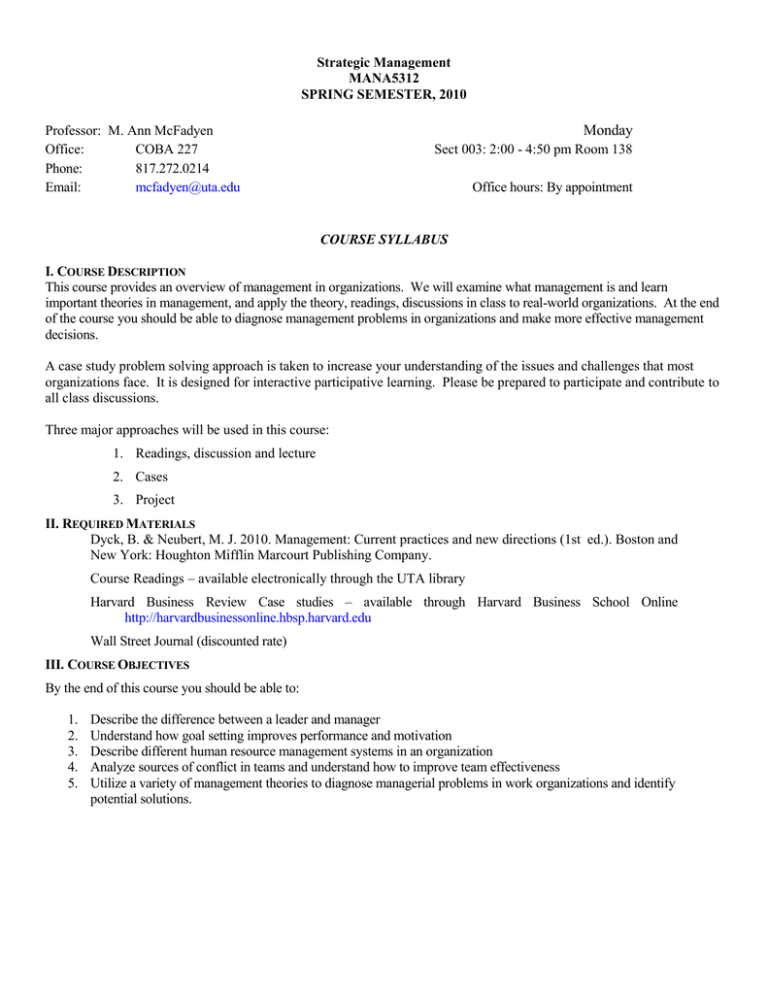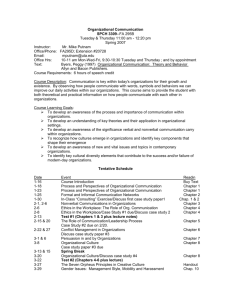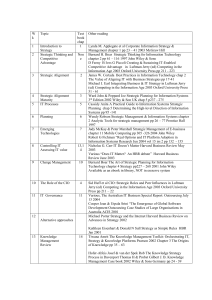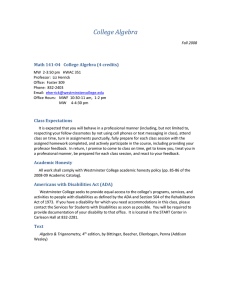Syllabus
advertisement

Strategic Management MANA5312 SPRING SEMESTER, 2010 Monday Professor: M. Ann McFadyen Office: COBA 227 Phone: 817.272.0214 Email: mcfadyen@uta.edu Sect 003: 2:00 - 4:50 pm Room 138 Office hours: By appointment COURSE SYLLABUS I. COURSE DESCRIPTION This course provides an overview of management in organizations. We will examine what management is and learn important theories in management, and apply the theory, readings, discussions in class to real-world organizations. At the end of the course you should be able to diagnose management problems in organizations and make more effective management decisions. A case study problem solving approach is taken to increase your understanding of the issues and challenges that most organizations face. It is designed for interactive participative learning. Please be prepared to participate and contribute to all class discussions. Three major approaches will be used in this course: 1. Readings, discussion and lecture 2. Cases 3. Project II. REQUIRED MATERIALS Dyck, B. & Neubert, M. J. 2010. Management: Current practices and new directions (1st ed.). Boston and New York: Houghton Mifflin Marcourt Publishing Company. Course Readings – available electronically through the UTA library Harvard Business Review Case studies – available through Harvard Business School Online http://harvardbusinessonline.hbsp.harvard.edu Wall Street Journal (discounted rate) III. COURSE OBJECTIVES By the end of this course you should be able to: 1. 2. 3. 4. 5. Describe the difference between a leader and manager Understand how goal setting improves performance and motivation Describe different human resource management systems in an organization Analyze sources of conflict in teams and understand how to improve team effectiveness Utilize a variety of management theories to diagnose managerial problems in work organizations and identify potential solutions. IV. Grading Grades for the course will be computed as follows: Assignment or Event A. Class participation B. MidTerm Exam C. Case Writeup D. Case Presentation Total Points Possible Points 20 30 30 20 100 CLASS PARTICIPATION Much of the value of this class emerges from the discussion of the various types and aspects of strategic management. This requires that class members participate in the class discussions. Participation is more than attendance. It is impossible to participate without attending, and simply attending does not equate to participation. Put differently, attending class without contributing to class discussions does not earn any points. You must contribute to the discussions to earn points. Class participation makes up 20 percent of your grade. MID-TERM EXAM You will be given one (1) take home essay mid-term exam. The mid-term will make up 30 percent of your overall grade. A make-up examination, which is only given for University excused absences, will be given within a week of the original examination date, and will be given on campus. INDIVIDUAL CASE You are asked to conduct an organizational analysis of a management challenge facing an organization. You can choose any organization to which you have access (i.e., an organization that you work for), or you may choose an organization for which there is information available about an organizational problem that you can evaluate. The only organizations which you may NOT choose include those which we already cover with cases in class. The case and presentation will include the following: 1. Describe the organization, what the organization does, and their competitive landscape. 2. Identify a management problem faced by the organization or a management initiative the organization has implemented. You will need to collect data about the organization through any channel you have available to you. Suggested forms of data collection include: a. Interviews with key management personnel or employees b. Employee surveys c. Focus groups d. The organization’s website e. Please refer to http://libguides.uta.edu/org (MANA4322 course guides for additional resources.) (i.e.Standard’s and Poor’s Net Advantage, Mergent Online, Wharton Research Data Services). 3. Review the literature pertinent to the problem or intervention. Literature sources might include a. Your textbook and articles assigned in this class b. Articles on management theory and models (see the above library resources) c. Books that cover management theory 2 When choosing sources, focus on sources by management scholars with solid credentials. Be careful of popular management books which describe a management fad with no theory or evidence from real organizations as to its effectiveness. If the authors have PhDs and are college professors or reporting empirical findings, sources are likely credible. If the authors have extensive executive level business experience and are making suggestions based on methods used in their experience, you should also be fine. If you have questions about the credentials of your sources, I will be happy to help you evaluate them. 4. Recommendations or Evaluation. Based on your review of the literature and knowledge of management theory, make some recommendations to the organization about how they might solve the problem they are facing. Due March 8: Deadline to turn in an outline of your project identifying the major aspects of the topic that will be covered presentation and paper. Due April 19: A written case (8-10 pages double spaced, no longer) discussing your organizational analysis is due. It should include a description of the organization and its line of business as well as a description of the problem facing the organization, or the intervention the organization adopted. Please cite relevant references. Late papers will NOT be accepted. However, handing your paper in early is encouraged. Due April 19, 26, or May 3: Each individual will make a 20 minute presentation for class about their project. This should be a case presentation about the firm and the problem or intervention and your recommendation. A 10 minute class discussion should be facilitated around the problem or intervention. OTHER INFORMATION CLASS CONDUCT Conduct that is unprofessional or otherwise detracts from the educational goals of the course may be penalized at my discretion by reducing the offender’s participation grade. If the problem becomes acute, further disciplinary measures may be imposed consistent with university policy. LATE PENALTY Assignments that are turned in late will be penalized ¼ of the total points possible. For example, if an assignment is worth 20 points and is turned in late, it will automatically be assessed a five-point penalty. ATTENDANCE POLICY This course depends on not only attendance but also participation from all students for every class. As a member of this classroom you are obligated to complete all assigned work promptly, to attend class regularly, and to participate in whatever class discussion may occur. Absence from more than 10 percent of the scheduled class sessions, whether excused or unexcused, is considered excessive and a grade penalty will be assessed for such absences. SANITY CHECK You are encouraged to provide me feedback as to your feelings on the course. I will periodically ask you for anonymous, written feedback during the course in addition to the formal evaluation at the end of the course. You are encouraged to be forthright with me regarding improvements that may be made to the course. STUDENTS WITH DISABILITIES The Americans with Disabilities Act (ADA) is a federal anti-discrimination statute that provides comprehensive civil rights protection for persons with disabilities. Among other things, this legislation requires that all students with disabilities be guaranteed a learning environment that provides for reasonable accommodation of their disabilities. If you believe you have a disability requiring an accommodation, please contact Disability Services for Students at 3 817-272-3364 or visit the website: http://www.uta.edu/disability/links.php. No accommodations will be provided to students unless they are registered with the Disability Services for Students. LAST, BUT NEVER LEAST Scholastic dishonesty will not be tolerated in this course. Scholastic dishonesty includes plagiarism, which is passing someone else’s work off as your own. Although it is easy to cut-and-paste from websites and other digital media, this generally constitutes plagiarism UNLESS the individual or organization is given proper credit through citation in your paper. If you have any questions about this, please talk to me before turning in the assignment. To obtain information on what constitutes scholastic dishonesty and how the university addresses it visit the website: http://www.uta.edu/studentaffairs/judicialaffairs/academicintegrity.html. 4 TENTATIVE CLASS SCHEDULE (Subject to changes announced in class) We may have several guest speakers this semester. Attendance and business attire is mandatory for all guest speakers. Date Assignment Topic Chap 1 Chap 2 Introduction Kanter, R. M. 2009. What would Peter say. Harvard Business Review, 87(11): 64-70. Introduction to management A short history of management theory and practice Chap 5 Ethics January 25 Class 1 February 1 Parker, J., Volokh, E. & Halloran, J. 2006. “The Reign of Zero Tolerance”. Harvard Business Review, 84(11) 39-52. Class 2 Bhide, A., & Stevenson, H. H. 1990. Why Be Honest If Honesty Pay. Harvard Business Review, 68(5): 121-129. February 8 Class 3 Chap 6 Entrepreneurship Stevenson, H. H. & Gumpert, D. E. 1985. The heart of entrepreneurship. Harvard Business History Review, March-April: 85 - 94. Bhide, A. 1996. The questions every entrepreneur must answer. Harvard Business Review, 74(6): 120-130. Case – Google Inc. HBR 806105-PDF-ENG February 15 Class 4 Chap 13 Chap 16 Organizational Change Groups and Teams MediSys Corporation: The IntensCare Product Development Team” HBR Case (4059) by Anne Donnellon & Joshua D. Margolis February 22 Class 5 Chap 8 Setting Goals and Making Plans March 1 Class 6 Chap 12 Human Resources Management HBR “A New Mandate for Human Resources” Organizational Analysis Outline DUE March 8 Class 7 MidTerm Due 10pm Spring Break 5 March 22 Class 8 Chap 15 Leadership Zaleznik, A. 1992. Managers and Leaders: Are They Different? Harvard Business Review, 70(2): 126-135. “GE & Jack Welch’s Leadership” HBR Case March 29 Class 9 Chap 14 Motivation “Portman Hotel” HBR Case April 5 Class 10 Chap 9 Strategic Management Beinhocker, E., Davis, I., & Mendonca, L. 2009. The 10 trends you have to watch. Harvard Business Review, July -August: 55 - 60. April 12 Class 11 Wrap up April 19 Class 12 Case presentations April 26 Class 13 Case presentations May3 Class 14 Case presentations 6





